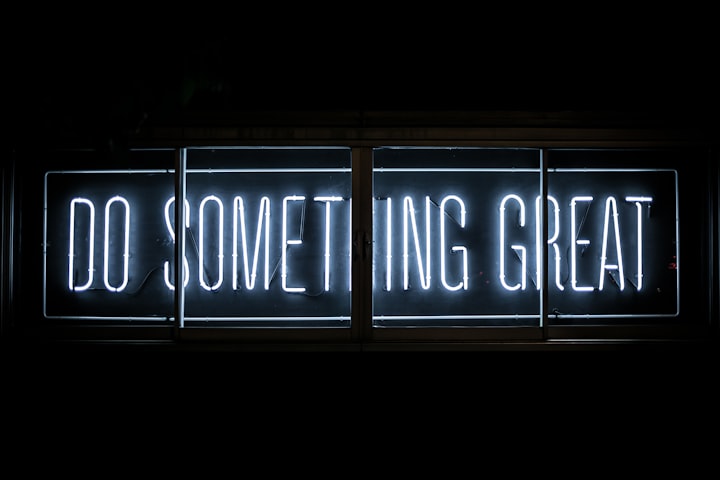New Habits
Why they're difficult and how to make new ones

Trying to incorporate new and better habits is so incredibly tough.
Why is it so hard though? When we really want to kick our old habits to the curb and bring in healthy habits, why does it seem like we just can’t? Well, I have some reasons as to why it is so difficult and ways to get over those obstacles and into a healthier routine!
We take on too much too fast
How many times have you started trying to change an aspect of your life and you start off doing everything differently? You stop eating candy cold turkey, you give up coffee, you start trying to run 3 miles a day, you decide to start working out 6 days a week when you haven’t worked out in 2 years. Has this ever worked for you? Chances are, no.
When we start off by doing way too much our brain is overwhelmed. We are used to doing things a certain way and now all of a sudden nothing is the same. It sends us into this state of limbo where we’re not really sure what is going on. Randomly we’re trying to force ourselves to get up 4 hours earlier, go to bed 3 hours earlier, chug water all day in amounts our body hasn’t seen in years, it just makes no sense. However, this is what people normally do! We feel like if we’re doing the small changes it’s not enough so we just do everything.
The best way to start making changes is by making small changes. When you lay out your ideal day and routine, how different is it from your routine currently? If ideally you want to be waking up 3 hours earlier for whatever reason, start by setting your alarm 30 minutes earlier for a week. Then move it up another 30 minutes, and little by little your body will adjust and you will be able to wake up at the time you want. During this time you can try and add in a habit or two in the free time you now have, or you can just try and wake up and adjust to functioning at your new time.
If you’re wanting to start working out, try by starting 2-3 days a week, and start by walking. Or start by doing some basic weight lifting exercises such as squats, pushups and situps. Don’t immediately start sprinting when the last time you did you were chasing your dog down the street. Small, steady, consistent changes are the key to changing your habits.
Our brains do NOT like change
Our brains very much like consistency. They want everything to remain the same, because then everything is in our control. When you start changing things your brain starts to panic a bit. We have a little thing in our brain called the amygdala that sees change as a threat and sends us into fight, flight, or freeze.
The amygdala is a small piece of our brain, near the center, that is responsible for emotions, emotional behavior and motivation. When we start to change things and step outside of our comfort zone, our prefrontal cortex (responsible for impulse control and insight) fires up, gets overwhelmed and then it connects to our amygdala and freaks us out. We get filled with anxiety and dread and we want to do everything humanly possible to stop these feelings. Which is completely fair, dread and anxiety suck. We end up switching back to our old behaviors and habits and settle back into our comfort zone.
How do we prevent this? Technically you can’t. What you can do though, is get some handy dandy tools to help you through the uncomfortable parts of change. One thing that helps me a ton is rewarding myself when I do accomplish goals that are related to a change in behavior. For example, if I actually get up on time every day for a week, I can buy myself a coffee or a Redbull spritzer on Friday or Saturday. If I reach my step goal every day for a week I get to take a bath. Little rewards received consistently are more helpful than you would think!
Another way that I am able to push past the discomfort is visualizing or journaling about how this new behavior will improve my life. Writing out the pros of the change is a big help, things that help you feel more secure in your decision, no matter how silly or small, can and will help you continue building on this new behavior! If you’re anxious about starting to go to the gym or workout make a pros and cons list. It might look something like this:
Pros:
I will get into better shape if I consistently go
Exercise is proven to help mental health
Exercise can help my sleep quality
Boost in confidence
Exercise improves concentration
Exercise helps boost energy
I will feel less stressed overall
Improves digestion
Cons:
Travel to the gym
Expending energy
When you lay it out you can tell that working out will benefit you more than it will hurt you. You will gain so much more in your life by getting up and doing what you know will improve your quality of life. You can do this with pretty much any new healthy habit!
We underestimate the difficulty
Sometimes, when we start out on a new venture we don't realize just how difficult it is going to be. We underestimate how uncomfortable it will be and then we say it’s too hard, we aren’t meant to change and we give up.
When you start trying to implement a new habit or a new hobby, really think about what the struggles will be. If it’s a new hobby such as a new instrument, chances are it won’t come easy, you will have to practice a lot, and you will have to really dedicate your time towards it. When you want to start waking up earlier the pull of your nice warm bed and some extra sleep will most likely be irresistible. You have to strengthen your determination and get your butt up, every day, when you could be sleeping. This will help your day and your morning go so much smoother and you will get so much more accomplished but you will probably start off pretty tired, and you’ll start off not wanting to do it. You have to push through all of that discomfort to get to a place where the new habit is automatic.
We forget failure is normal
So many of us, myself included, have a fear of failure. We start something new, we try something different, then as soon as we fall partially off the wagon we get this all or nothing mentality that we fell off once, we can’t recover, there’s no way we could do it and succeed. We’re too scared to fail again so we just bail on the entire venture and call it good.
Instead, why don’t we try and learn from our failures? They were all opportunities to grow as people, see what our downfalls are, and really evolve. Next time you feel as though you failed, think about why that failure happened. Was there a way to prevent it? What obstacle made it so you didn’t meet your goal? Did you get side tracked by social media? Was there something scary that you didn’t want to do and kept putting it off? Whatever it was, you’re now better prepared for it. Next time, you can set up a better plan and be able to avoid that obstacle.
If it was an idea that failed, you now know that that idea isn’t going to work. Take this as an opportunity to revisit the idea, see where it failed, and see how you can get it to work next time! Failure is an opportunity to learn. Learn about ourselves, learn about other things, learn about anything!
Think about a time when you succeeded at something on the first try? It felt good but did you really learn anything? Probably not. Now think about a time where you had to try over, and over, and over again to get it right. When you finally got it right it felt amazing! You really were able to hone in on the process and thoroughly understand it. Think of all of the new habits in the same way. We are all created differently. Therefore, we will most likely need to have different approaches and different processes to new habits. Try things out, test the waters, dive in!
We don’t give the habit enough time.
I recently read an amazing book that taught me something about new habits. It was called “The 5am Club” and I highly recommend it. There’s a model in the book called the Habit Installation Protocol. It’s extremely interesting and I’m excited to test it out myself. In this model, there are 3 stages that total 66 days, so each stage is 22 days. The author, Robin Sharma, says that it takes 66 days to install a new habit into our brain and our routine and so many people just give up before they get to the automaticity point.
Stage 1 is deconstruction. In this stage, you are destroying your old habits. It is uncomfortable, you won’t want to be changing anything, you will want to continue doing what you’ve always done. Your brain is breaking down the old you. Stage 2 is installation. This stage is when you are really starting to install this new habit as a part of your new life. Your old habit has been broken down and you are creating something new to go in its place. Stage 3 is integration. This stage where your new habit is now commonplace in your life. You no longer struggle to get it accomplished, all of your hard work is paying off. This new habit is your new reality. Then, around 66 days into the new habit it becomes automatic. It then becomes harder to not do the new habit than it would be to slip back into your old routine. When that happens you have reached the automaticity point.
Most people try things for 21 days, maybe a month. You’re still in the uncomfortable phase of this habit! You give up before you really give it a chance. We think that we just try something for a limited amount of time and if it’s not natural then it’s not meant for us which is ridiculous. I’ve done it myself and it is absolutely ridiculous. I used to think I could never get on a sleep schedule. I thought there was no way I was getting up at 4 am ever in my life unless I had to for work, or I was travelling. I now wake up at 4am or earlier 5 days a week. It is pretty much automatic. When I don’t wake up that early I feel extremely thrown off and I get confused easier. I used to think I wouldn’t ever be able to fall asleep before 10 pm. I now am in bed and usually asleep by 9pm if not earlier. All I had to do was keep at it. I’ve been on this routine for about 6 months now. It’s second nature. Even when I’m not home I get sleepy around 7:30-8:00 pm and I wake up naturally around 5 or 6 am on the weekends.
If there is something you have always really wanted to do, something you have always really wanted to change, give yourself time to adjust. Take the full 66 days, go through the uncomfortable phases to get to that point of automaticity. It’s really beautiful on the other side!
About the Creator
Emily McDonald
27, fur mom, mental health focus. I'm also a fitness and lifestyle blogger. I hope you enjoy the content!






Comments
There are no comments for this story
Be the first to respond and start the conversation.